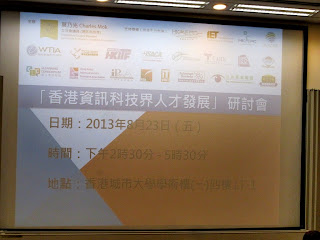In the beginning, Mr. Charles Mok (Legislative Council Member (IT Functional Constituency)) gave an introduction speech. He said many IT companies faced a problem on employment both quality and quantity. He also suggested to focus on primary and secondary school students; as well as, to attract them to study IT subject in university.
Group photos with speakers and supporting organizations
Mr. Daniel Lai (賴錫璋) (The Office of the Government Chief Information Officer ) was the guest speaker and he gave an opening remark. He said Hong Kong had a outstanding ICT infrastructure and the IT participants increased from about 66700 to about 78700 in the period from 2009 to 2013. Moreover, he introduced some programmes such as iCity for Form 3 to Form 6 students and 7 TV programmes, etc.
The first speaker was Prof. Kar Yan Tam (Associate Provost, Dean of Students, Chair Professor of Information Systems, Business Statistics and Operations Management, HKUST) and his topic named "Hong Kong IT Manpower Development".
Prof. Tam introduced VTC bi-annual IT Manpower Survey since 2001. The top three Job Categories were IT Software Development (37%), Operation Services (22%) and Field Support (11.7%). There were 1806 vacancies in May 2012. The following diagram showed the distribution of IT employees by Sector.
The percentage share of IT employees in the Labour Force from 2000 to 2012 were discussed. It was found that the ratio increase from about 1.8 to 2.1 since 2000.
After that Prof. Tam discussed the supply and demand of IT graduates. Total headcount of the 7 UGC funded institutions form Engineering/IT-related disciplines was 14,650. But only few of them serviced in IT industry (see diagram below).
Finally, Prof. Tam pointed out four potential growth areas in IT field included "Movie and Entertainment (e.g. Computer animation)", "Finance (e.g. Quantitative modeling)", "Legal (e.g. Data Center, Cloud Computing and Big Data Service)" and "Intellectual Capability (Research centre for large consumer electronic)".
The second speaker was Mr. Michael K M Leung (FHKCS, Senior Vice President & CIO, China Construction Bank (Asia) Corporation Limited) and his presentation entitled "Market Demand of IT Professionals".
Mr. Leung briefed the IT value proposition included "Localization of solutions from overseas and Globalization of local ones", "Business-cum-IT knowledge & skills", "Higher-value jobs (e.g. system architect & decision science analyst)", "Innovation" and "Cross-border collaboration (e.g. HK's software advantage - legal system, management)". The following diagram demonstrated different IT job categories.
Then Mr. Leung pointed out some important IT skills in demand included ".NET, Java & Hypertext Preprocessor (PHP) programmers", "Data analysts / Decision Scientists", "System Architects" and "IT Auditors & Compliance Specialists".
Mr. Leung said HKCS performed IT Man Power Market Survey and the results would be announce in next week.
Discussion Forum then performed.
Dr. Edith Mok (Director, The Hong Kong Institute for IT Professional Certification (HKITPC)) was the third speaker and her speech was "Towards Professional Certification for IT Professionals (IT 從業員的專業認證)"
Dr. Mok introduced the roadmap of the certification through HKQF. The CPIT certification scheme included Project Director, Systems Architect, QA Managers, Associate Project Manager, InfoSec Officer and Business Analyst.
The following diagram showed the details of IT Career Roadmap.
Then Dr. Mok explained the reasons for selective certification included "Identifying needs", "Setting the standards", "Differentiation", "Collaboration" and "Complementary effort".
The forth speaker was Mr. Raymond Woo (Chairman, The British Computer Society - Hong Kong Section) and his topic named "IT Manpower Forum".
Firstly, Mr. Woo discussed the IT Manpower Gap and questioned "If it is NOT broken, don't fix it!". He explained that Broken implied "Lack or poor technical competence", "Lack of the skills demanded by the market", "Job NOT well done", "No requirements" and "Professional Conducts". He concerned if Hong Kong went forth with own ICT Professional Registration which would increase Cost and Time spent.
Then he discussed how to improve the ICT Ecosystem for HK ICT SMEs. Could the public and private sectors consider "Local ICT First"? Finally, Mr. Woo concluded his talk by following statement. "What matters ... Is to do the most needed thing at the need time for the greatest benefits of the stakeholders, i.e. ICT Practitioners, Public and Private Sectors, and the Community as a whole."
The fifth speaker was Ir. Dr. C. L. Chan (Chairman, Information Technology Division, Hong Kong Institution of Engineers) and he shared his view on IT Manpower and Chartered Engineer in ID Division through HKIE.
Dr. Angus CHEUNG (Chairman, The IET HK) was the final speaker and his presentation title was "ICT Professional Registration through the IET". He introduced IET professional registration included Chartered Engineer (CEng), Incorporated Engineer (IEng), Engineering Technician (EngTech), ICT Technician (ICT Tech) and Chartered IT Professional (CITP).
The competence and underpinning knowledge and understanding of each registration were discussed. The level of competence for ICT Tech and CITP were created by the industry and adopted SFIA Skills Framework (http://www.sfia-online.org/)
Q&A session:
One of participants questioned how to attract people study IT? Many young people thought IT is difficult to study, to do and to survive (難讀、難做、難生存).
Some participants questioned professional certificates were no use. Another said it should depend on demand and supply. Somebody worried the scope of certification examination was not able to catch the fast change ICT environment.
SME bosses were feedback difficult to employ right IT people.
Reference:
IT人才發展有前景 - http://www.skypost.hk/column/莫乃光/007001004041/IT人才發展有前景/106636
Leaflet - http://www.hkcs.org.hk/whatsnew/20130814/files/IT_Manpower_eFlyer6.pdf



















沒有留言:
發佈留言